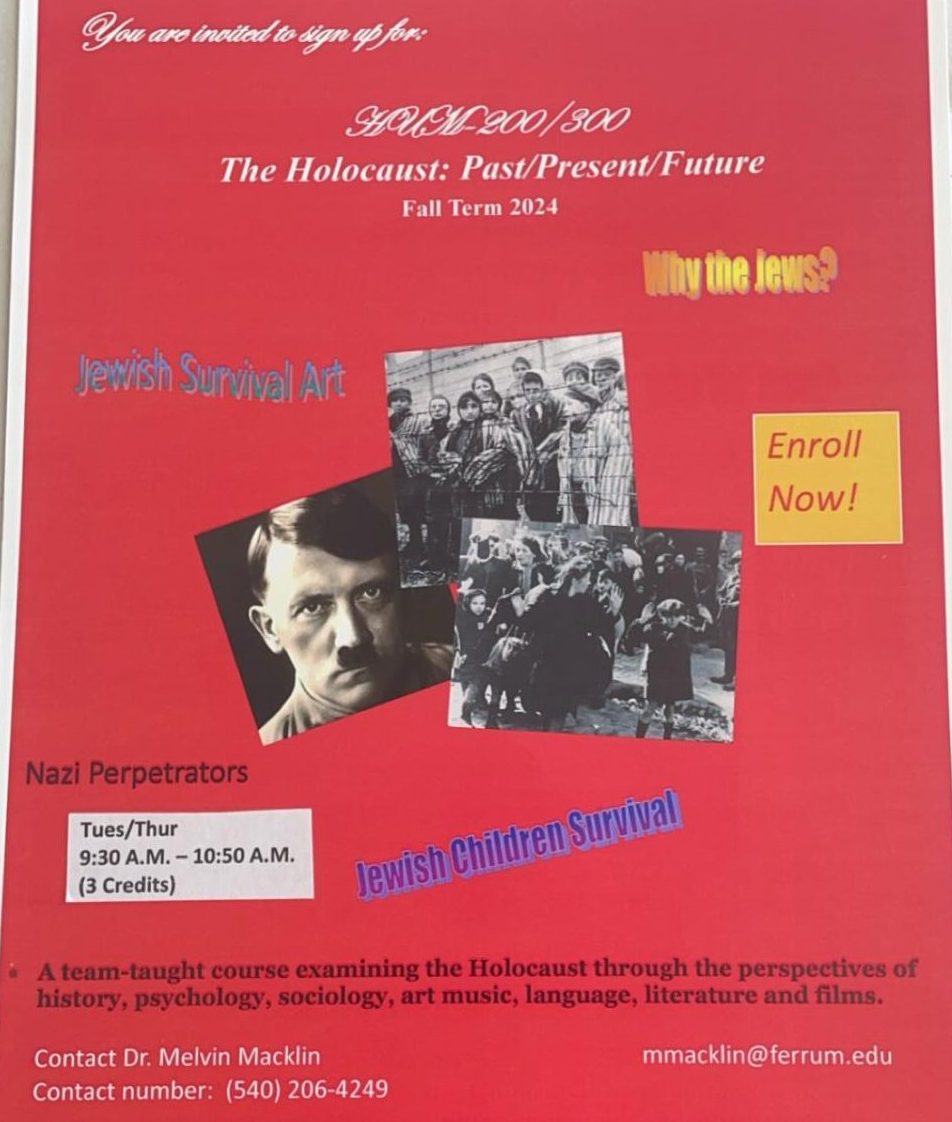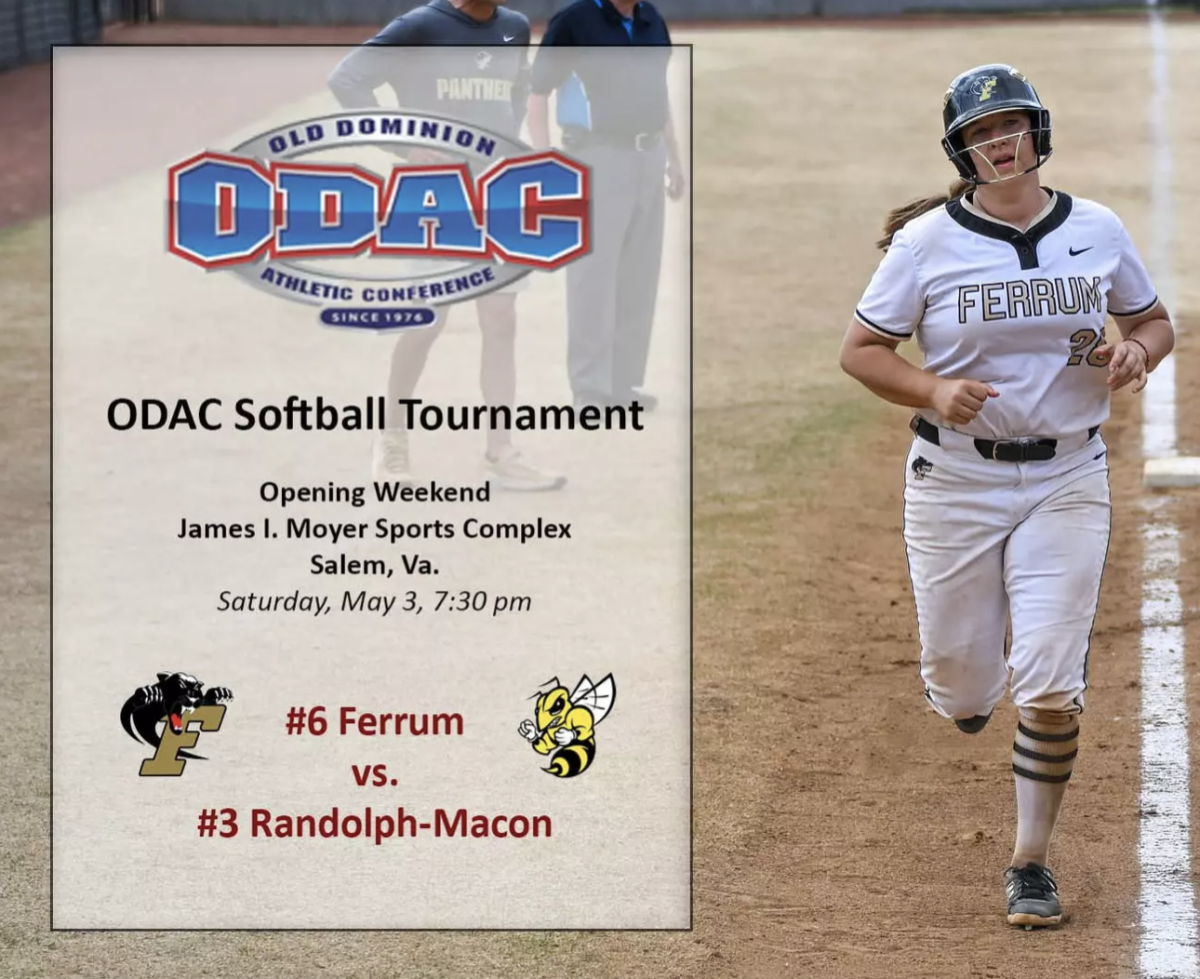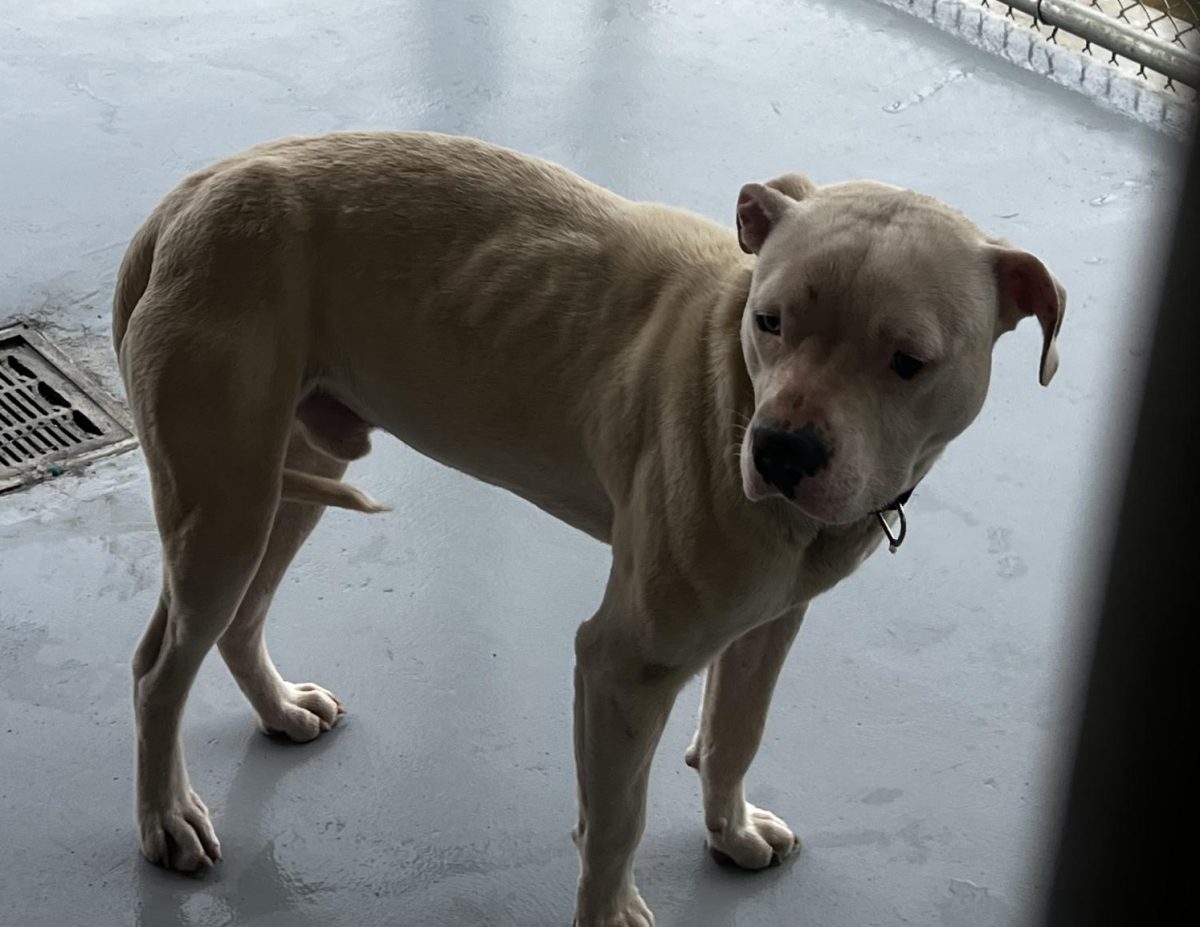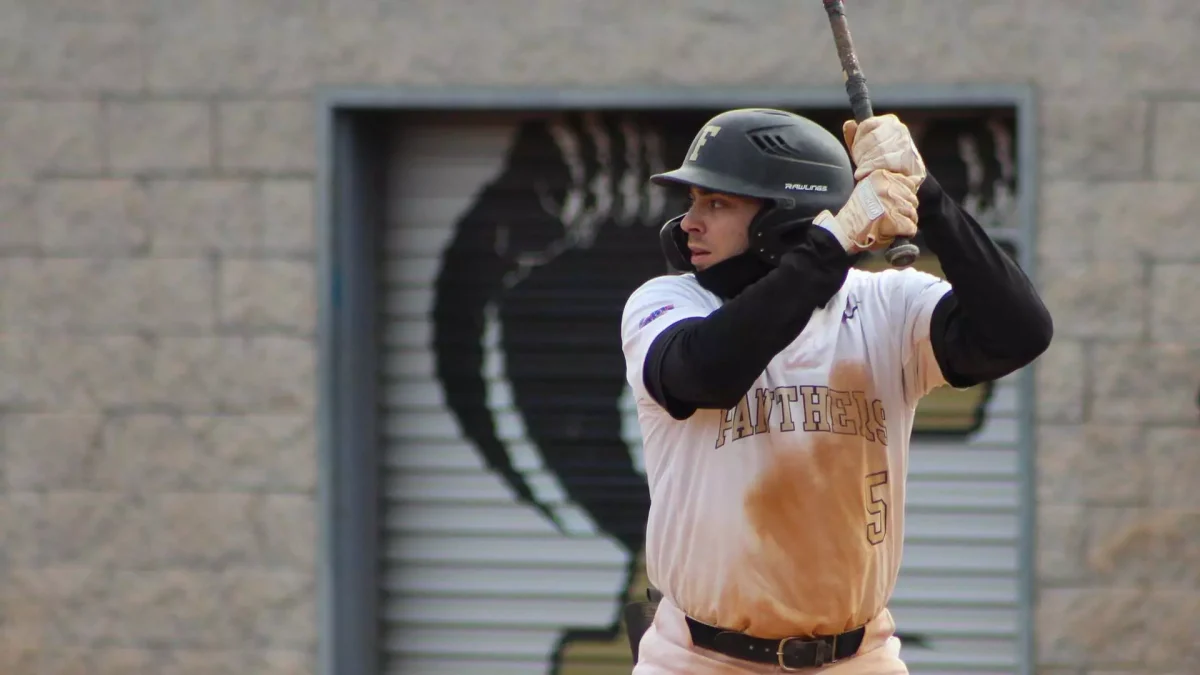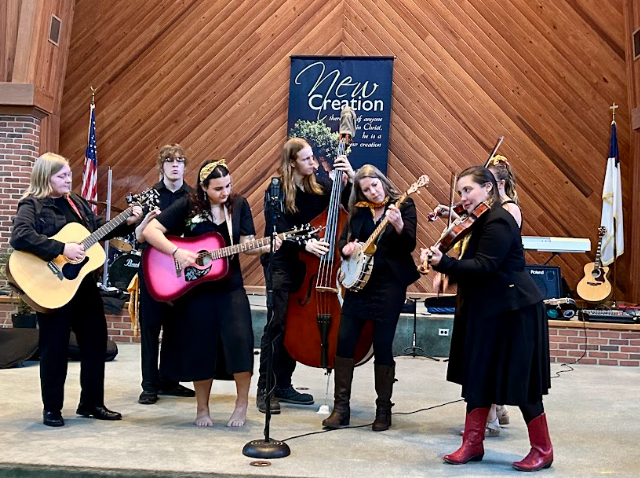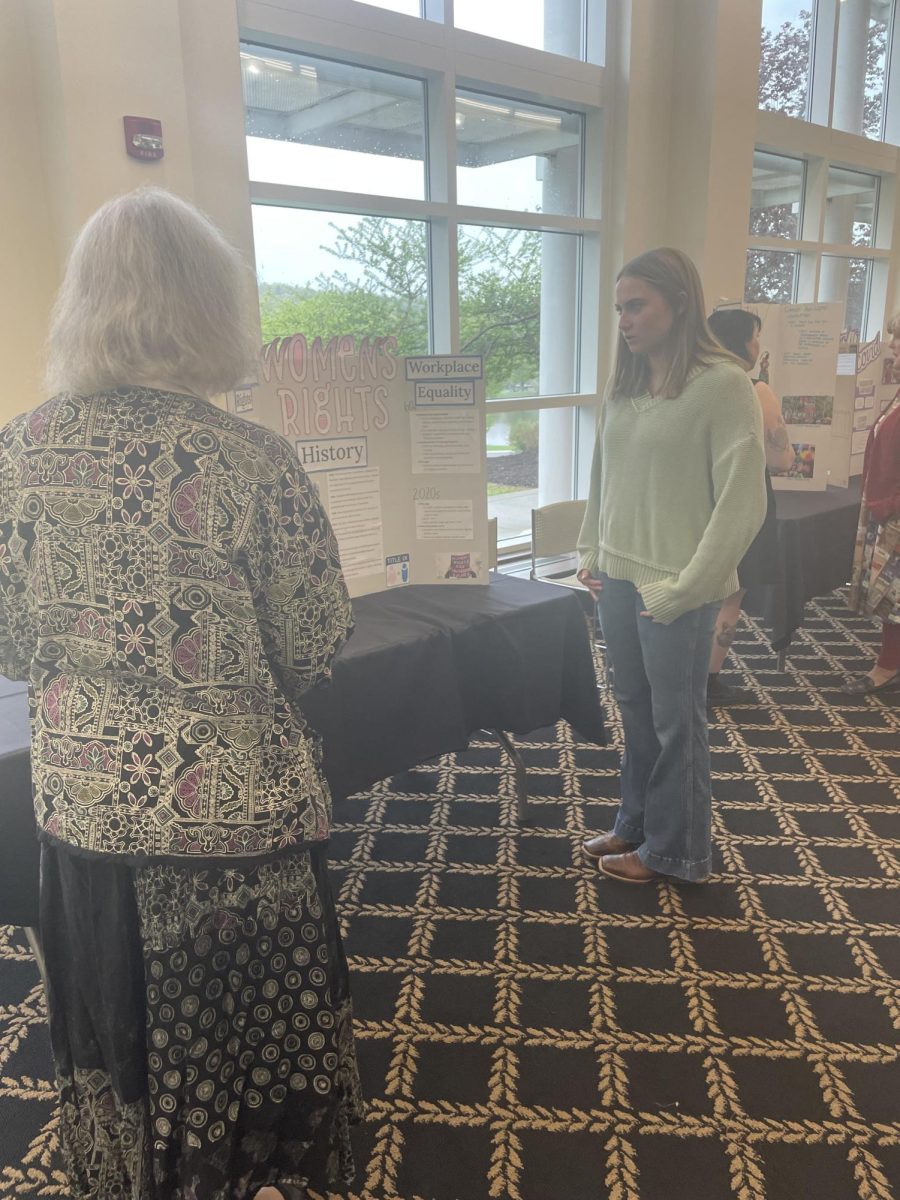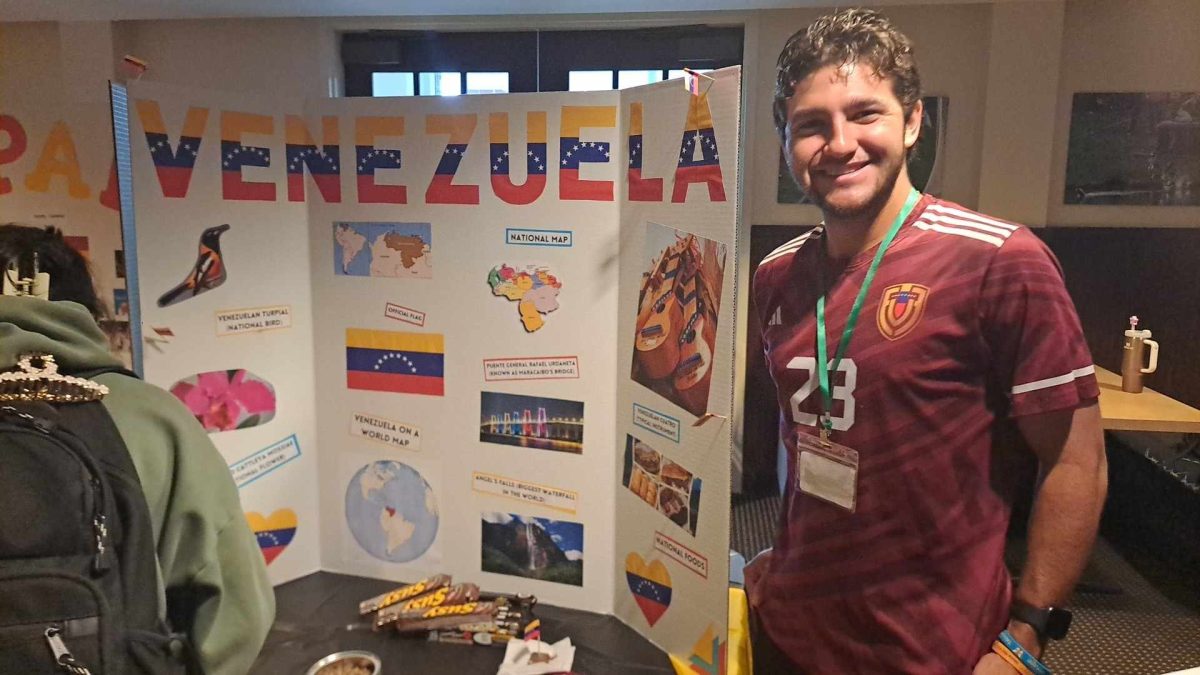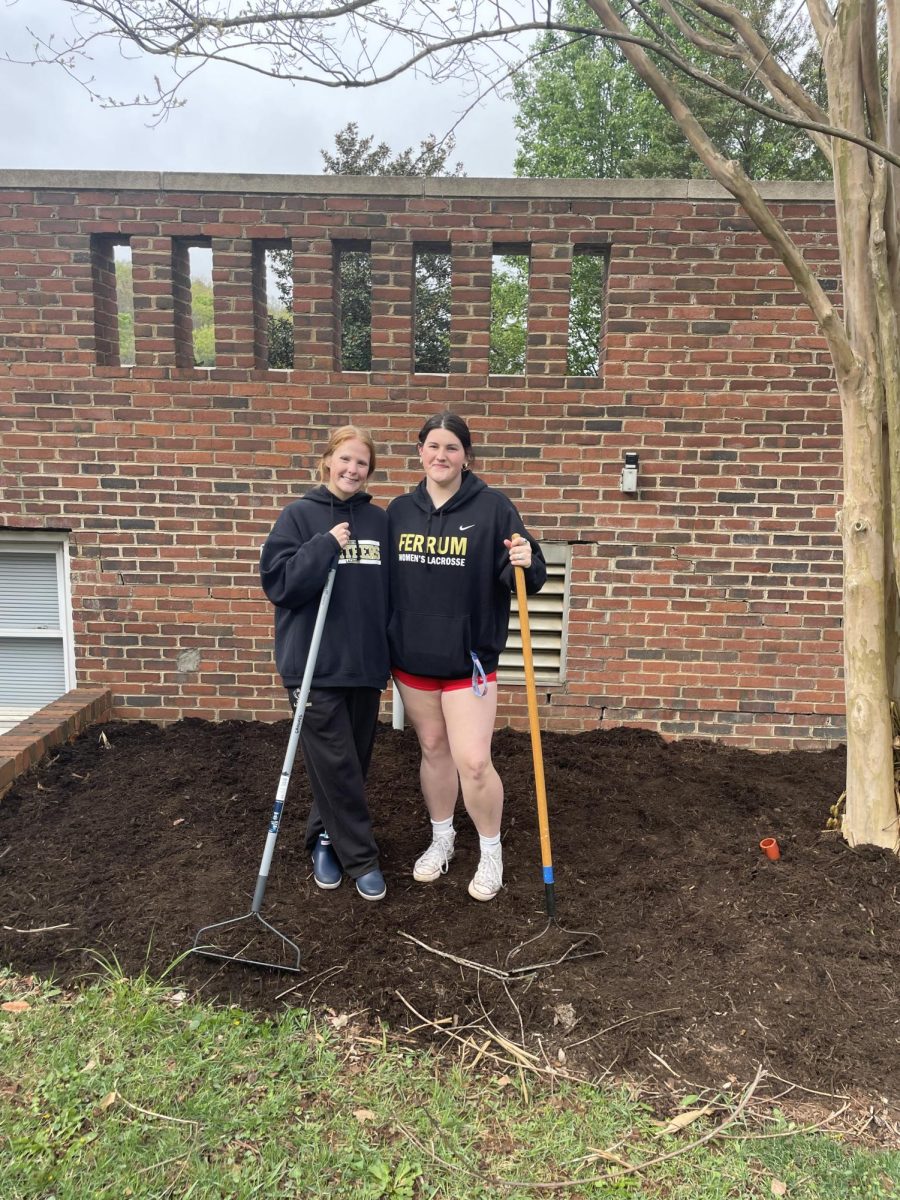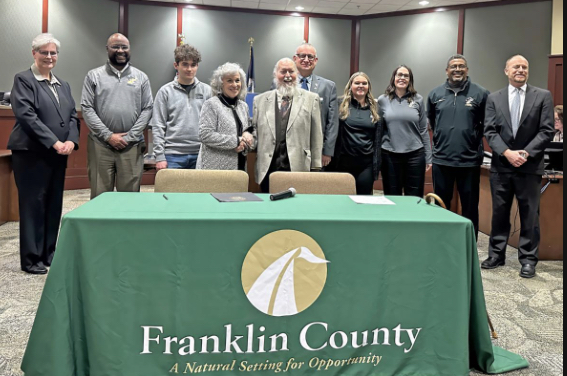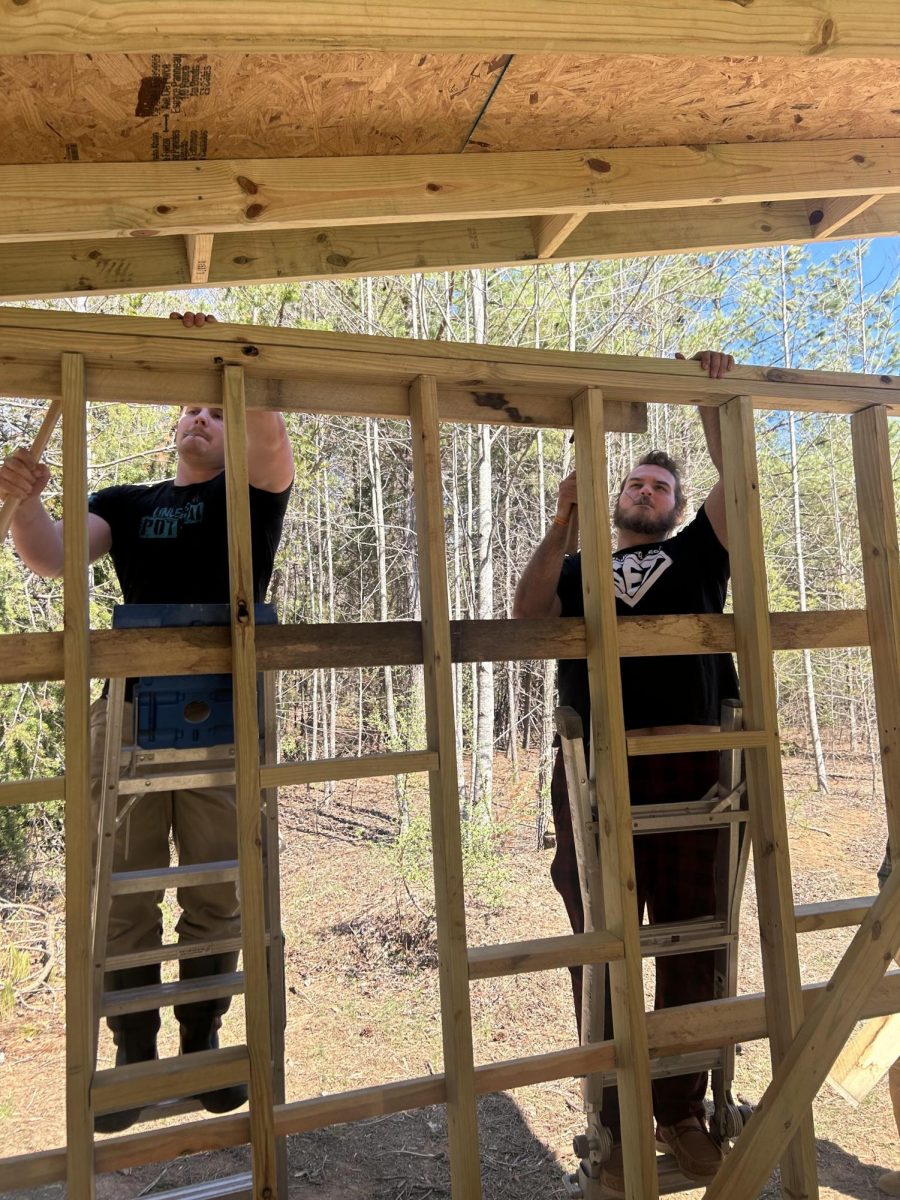“Never again.”
The phrase points to the Holocaust, as its infernal chapter in history is an iniquitous page turned, and is on no account forgotten.
It was an event–inhuman, merciless, and nearly implausible in itself–that perpetually altered the lives of so many, with our own academic endeavors not lacking exception.
The Holocaust not only signaled reverberations in history, but its influence also imprinted its effect in fields of psychology, sociology, art, music, literature, and language–subjects notable to any and every scholar.
Its grasp extends far beyond the reach of any one disciplinary study, and the unabridged comprehension of the Holocaust is a mission merely impossible. Comparatively, few colleges even offer programs or courses in regard to such a dark aspect of history.
And yet, this college is one of them.
Typically offered throughout the spring semester of even years, Humanities–Holocaust: Past/Present/Future is a multidisciplinary, team-taught course in both the 200 and 300 level. It takes a deep dive into the historical and social conditions that lead to the mass genocide, the resulting dehumanization and death, survival strategies, and imminent post-war dangers of neo-Nazism, totalitarianism, racism, and intolerance.
With the addition of pertinent and personal reflection on the subject matter, the team of seven doctorate-certified professors teach the course in conjunction with one another, creating a platform of teamwork and the sharing of diverse perspectives through the seven disciplines covered throughout the curriculum.
Overall, the course offers a program best termed as unique, according to Marcia Horn, professor emeritus and program founder, and is an opportunity unparalleled that truly demonstrates the nature of the small, lively campus on which so many students call home.
However, it wasn’t always this way.
In fact, when Horn began her career here in 1986, the concept of a course encompassing the Holocaust alone was a revolutionary idea in itself.
“Ferrum wasn’t the place it was now,” Horn reflected, “and it was not the kind of place to offer a course like this. It was such a radical idea.”
Looking back in reminiscence, however, the idea was once radical to Horn, too.
She first began her career at the college with the intentions of teaching introductory courses in Shakespeare. She arrived on campus with a doctorate in her field, unknowing of the path less taken she would soon choose in her 24 years here–one that would carve a journey for generations to come.
“I originally came to teach freshman and sophomore Shakespeare,” Horn explained. “But suddenly, my life changed.”
According to Horn, there were three events that altered her direction, and future, at Ferrum.
Her grandparents traveling to Germany to rescue two young Holocaust survivors as a selfless act of good will quickly became the first, and both the most personal and significant to Horn as well.
“I found out that my grandparents had saved two boys and took them in as their own once returning to the U.S.,” she recalled, smiling. “And that was one thing–one thing that was just, out of the blue for me, you know. I had no Holocaust connections other than the fact that my family is Jewish, and it wasn’t something that we particularly talked about.”
Her grandparents’ act of kindness impacted more than the lives of just the two boys. In fact, it became a crucial source of inspiration that guided Horn to apply for a summer fellowship at Research Triangle Park in North Carolina, the largest research park in the United States and among the most prestige academic institutions.
She found herself, alongside other scholars, under the instruction who specialized in African American Slave Narratives and the Holocaust and taught her own courses on the subjects at her home university. As the summer progressed, the intensive classes became a second experience that guided Horn’s path toward her legacy that remains today.
“We went to the Holocaust Museum in DC during the intensive,” she remarked, “and our instructor was playing survivor tapes on the bus as we drove from North Carolina, past Ferrum, all the way to DC and all the way back.”
It was an eye-opening experience for Horn.
The Holocaust was a subject that had caught her eye and an interest that she would never forget–hence the priority she made to attend a seminar offered by then-Hollins College that highlighted a 16-year-old Holocaust survivor.
She felt is was was a window of opportunity too golden to miss. She not only attended the event but invited the survivor to Ferrum before departing.
“And that was my third,” Horn said, “There were three rings of that whole experience, and it really sparked my interest.”
And from a spark she became a flame, shining a light toward the subject of the Holocaust on a campus left in the dark.
“Before then, no one had heard of classes specializing in the Holocaust, and there was nothing like it at Ferrum,” Horn said. “So I discussed it with a few of my colleagues, and we determined–we have to have a course.”
And that is exactly what she set out to do. Except, there was one major problem.
“My doctorate is in Shakespeare,” she said, “I could not do it alone.”
However, Horn found no reason to accept defeat. She knew exactly what she had to do to make her newfound dream a reality.
“I took a year,” she said. “I didn’t have a specific topic yet, either, nor the necessary background, aside from the coincidence of my grandparents. I needed to go talk to more Holocaust survivors and find out much more than I knew, but in a first-hand perspective.”
And so, Horn took initiative, and she commenced her one-year sabbatical, traveling to vast and various locations to meet Holocaust survivors across the country, gaining both experiences and living stories.
While her time was not attributed to a sole location, Horn did spend a significant amount of time in California, where her family had connections to Jewish Synagogues on the coast that offered a safe place for survivors.
“There were so many survivors there,” she affirmed. “And so I learned from their words. That was where I started.”
She traveled from Virginia, to California, to Texas, and a myriad of states in between. Her trip ended most notably in South Carolina, where she found the answer she didn’t realize she had been searching for–the foundational concept of the course itself–from a survivor.
“It was a wonderful person in South Carolina who was a survivor, and we just hit it off right away,” she exclaimed. “Before I left that day, she said, ‘You know, Marcia, the Holocaust touched every discipline.’ And then a light went off in my brain.”
She knew–a course touching every discipline is what she sought to do. But with her expertise lying in Shakespeare, Horn knew she could not d0 it alone.
“The Holocaust did touch every discipline,” she offered. “(But) I only have a doctorate in one. But I did have both friends and faculty at Ferrum who were experts in their fields, so I gathered as many as I could, and from there we decided to meet.”
It was a task that would not be easy, but one that could be accomplished.
The very week Horn returned from her sabbatical, she recruited professors specializing in Spanish, Psychology, and Sociology. However, while acquiring the support of her fellow faculty proved to be almost facile, gaining the approval of the department chairs, who held the power to accept or reject the proposal, was another story.
Passing the course became a year-long process, and a nerve-wracking one, too, according to Horn. She knew it would be worth it, though.
“We had to pass a faculty meeting, and that was scary,” she explained. “Some members were hesitant, while others were quick to support, but we had to do it. I didn’t specifically say that we could be pioneers, but that’s what I was thinking, and that’s exactly what we were with this program.”
In 1999, Horn’s efforts concluded with success, presenting the first Holocaust course at here during the spring semester.
Since its establishment, the course has offered students an eye-opening educational experience, as well as the opportunity to make an impact on the community. In 2003, members of the college taking the Holocaust seminar created a Holocaust memorial garden on campus.
The idea for the floral project was developed by the students themselves, and still remains on campus. An introductory plague reading “Because they lived it, we teach it” centers the garden, a statement coined by a student of the time, ensuring such a piece of history is never forgotten at Ferrum.
Although, despite the flourishing scene of the Holocaust Memorial Garden, since Horn’s retirement in 2009, the prominence of the program has not continued to grow in the way she had once hoped. In fact, it’s been missing from the course catalog for two years.
“After I left Ferrum, the course was cut back to every other year,” she said, “It continued until the Pandemic.”
She refuses to accept Holocaust-focused education to be an aspect of the past.
“I don’t even want to use the expression that the class has come to an end,” she determined with optimism. “It’s been gone for two years, but that just means it’s about time to pick it back up. And that’s just it–we just have to pick it back up. The hard part has already been done.”
English Professor Melvin Macklin, aims to do just that and continue the legacy Horn left behind.
Macklin has recently taken the place of the original program coordinator, after playing a significant role in the course upon his arrival to the college in 2008.
“Everything regarding the course has itself is already in place–we just want to get it back up, ” Macklin asserted. “We’re in the process of doing that now–talking to students and faculty and getting them to take and promote the course.”
For Macklin, teaching about the Holocaust is a priority.
In 2000, he focused his education on Holocaust studies at the University of Texas and became the first African-American to graduate from the college with a doctorate in the subject. Macklin also studied under a European professor who was known for work as an author, scholar, and researcher for the Holocaust.
In addition to his background on the topic, Macklin has pursued professional writing about the Holocaust.
“Since my certification in the subject, I have written a manuscript,” he said, “which is a Holocaust survivors’ dissertation, highlighting the Jewish survivors of the Holocaust, as well as the survivors of slavery. I am currently looking to get it published as a high school textbook.”
English Professor Tina Hanlon views the significance of the course as a broad and societal perspective.
“It’s so important for people to learn from history,” she commented. “And it looks from a lot of things right now, people are not learning enough–especially with what’s going on today, with all of the wars hatred, and antisemitism, the need of this course is more important than ever.”
She also describes the nature of the course to offer benefit for students, particularly regarding the non-traditional structure of multiple instructors and disciplines.
“It’s everyday professors teaching history, art, psychology, sociology, literature, and so much more in context to the Holocaust,” Hanlon detailed. “I think interdisciplinary courses and team teaching are really valuable experiences because students can see you and can see the professionals interacting and get a lot of different perspectives.”
Overall, perspective and the promise of a better future for the program, those involved with it, and the world as a whole, seems to be the goal of this special course on campus, according to Hanlon.
The course is even open for members of the public to enroll, being free of charge to locals older than 65.
The only barrier standing in the way is the 10-student requirement to hold the class.
“Right now, the biggest thing is recruiting students. There is a requirement for 10 students in order for the classes to make the cut, so this is where we are,” Macklin said.
Only the highest hopes are held by the professors on campus as the fate of Holocaust education for the upcoming semester looms in the air.
For now, however, the sole phrase remains.
“Never again.”
Horn and Macklin hope two words fail to define the Holocaust course as well.
Person interested in the course may contact Macklin at 540-206-4249 or via email at [email protected]


